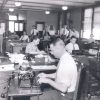calsfoundation@cals.org
Morgan Mercer Beatty (1902–1975)
Morgan Mercer Beatty was a native of Little Rock (Pulaski County) who launched a newspaper career at the Arkansas Gazette and became, during World War II, one of broadcast news’ early and most eminent reporters and commentators. Beatty became famous as the Washington DC and wartime correspondent of the National Broadcasting Company (NBC). He broke the story that President Franklin D. Roosevelt was selecting an obscure senator from Missouri, Harry S. Truman, to be his running mate in 1944, before Truman knew it. His analytical reporting on the war set a standard that few print or broadcast journalists could match. Beatty also figured out that the first atomic bomb was going to fall on Hiroshima while the event was being planned, although he had no chance to report it.
Morgan Beatty was born on September 6, 1902, in Little Rock to Hugh Mercer Beatty and Carolyn Hawkins Beatty. His father was a traveling tobacco salesman. The family, including Beatty and his younger sister, moved to Fort Smith (Sebastian County), where, according to the 1920 census, the elder Beatty was a traveling coffee salesman. Morgan finished high school there and then attended Centre University, a private liberal-arts college in Danville, Kentucky.
He landed a job reporting for the Arkansas Gazette and then for a couple of other newspapers before joining the Associated Press (AP) in 1927. When he told John Netherland Heiskell, the Gazette editor, that he was leaving, Heiskell said he could not leave until he repaid the newspaper for all the long-distance calls he had made to a girlfriend on the Gazette telephone. Beatty did not have the money but gave Heiskell his expensive camera, the newspaper’s first camera. Heiskell gave it to Beatty’s friend Joe Wirges, the newspaper’s police reporter and photographer.
Beatty married Mary Virginia Garwood in 1928 in Atlanta, Georgia, where he worked for the AP. They had two children.
Migrating around the country as AP reporters did, Beatty worked in several cities, eventually becoming bureau chief at Cleveland, Ohio, and Albany, New York, and entering the AP’s foreign service as war broke out in Europe. He then returned to Washington as a military analyst. He joined NBC in 1941 and went to London as the network’s war correspondent, then returned to Washington two years later as its national correspondent. In 1946, Beatty became editor-in-chief and commentator on NBC’s News of the World, a job he held until his retirement in 1967. For six years after leaving NBC, he was the analytical voice of AP’s NewsBreak, a tape service syndicated for broadcast stations. He wrote and taped five commentaries weekly until illness forced his retirement in 1975.
Beatty had some notable moments in his career. Announcing Roosevelt’s choice of Truman for vice president in 1944 was his biggest coup. Also, at the outset of war in Europe, Beatty compiled the first comprehensive map of the Western front. War Department strategists used his map, and the Library of Congress later exhibited it. He forecast Adolf Hitler’s drive into Russia. While others predicted a quick collapse of the Russian resistance, Beatty predicted stiff resistance when the Germans reached far into Russia. The disastrous Russian invasion proved to be fatal for the Nazis. Beatty covered the Potsdam Conference in Germany in July and August 1945 when the new president, Truman, met with Russian Premier Joseph Stalin and British prime ministers Winston Churchill and then Clement Attlee about how to govern the surrendered nation of Germany.
Beatty would recall a poker game with Truman on the cruiser Augusta returning from Potsdam. Truman had confided that the United States had developed an atomic bomb that might be used to end the war in the Pacific. A presidential aide brought a radio message to Truman, who quietly asked for a map. Beatty, who was holding his cards across from Truman, could see through the map, which was transparent from a strong light; he realized that it was a map of Japan, and detected where the aide was pointing. After the poker game was over—Truman collected about $400—Beatty went to a map and found the city that the president’s aide had pinpointed: Hiroshima. Three days later, on August 6, 1945, the bomb fell. There was no way for Beatty, on board the Augusta, to get the story out.
Beatty wrote a guide to Washington DC, first published in 1942 and reissued in 1956 as Morgan Beatty’s Your Nation’s Capital.
He retired to St. John’s, the capital of Antigua and Barbuda in the West Indies, with his second wife, Katy, and died there on July 4, 1975. He is buried in the cemetery of St. Phillip’s Anglican Church at St. John’s.
For additional information:
McCord, Bob. Interview with Ken Parker. Arkansas Gazette Project, David and Barbara Pryor Center for Arkansas Oral and Visual History. https://pryorcenter.uark.edu/project.php?thisProject=2 (accessed November 5, 2021).
“Morgan Beatty, Broadcaster, Newsman for 50 Years, Dead.” New York Times, July 7, 1975, p. 28.
Ernest Dumas
Little Rock, Arkansas






Comments
No comments on this entry yet.